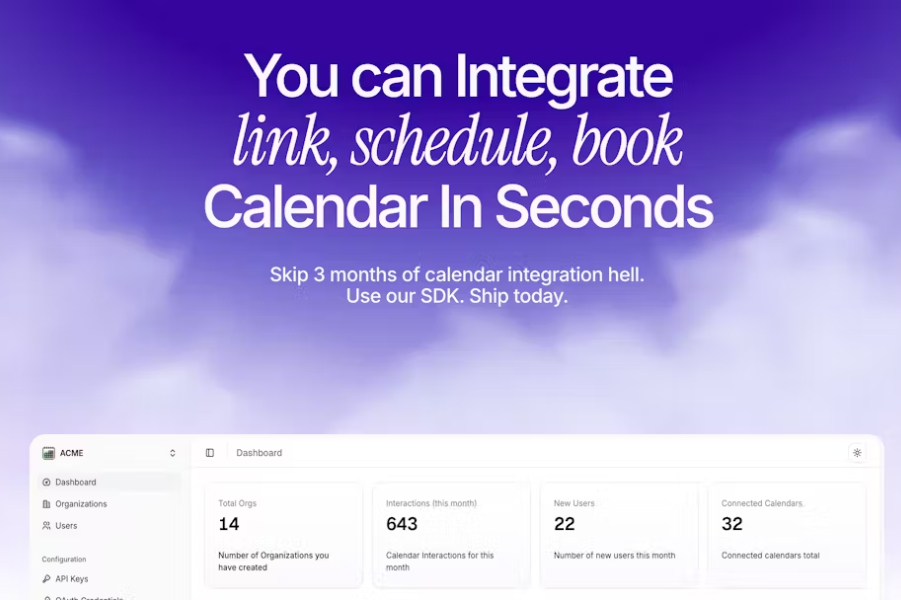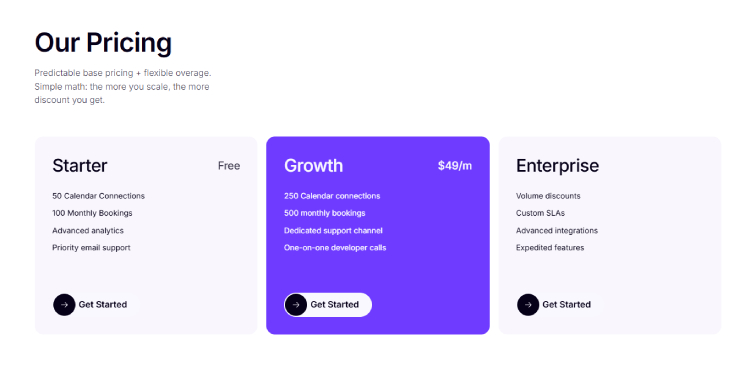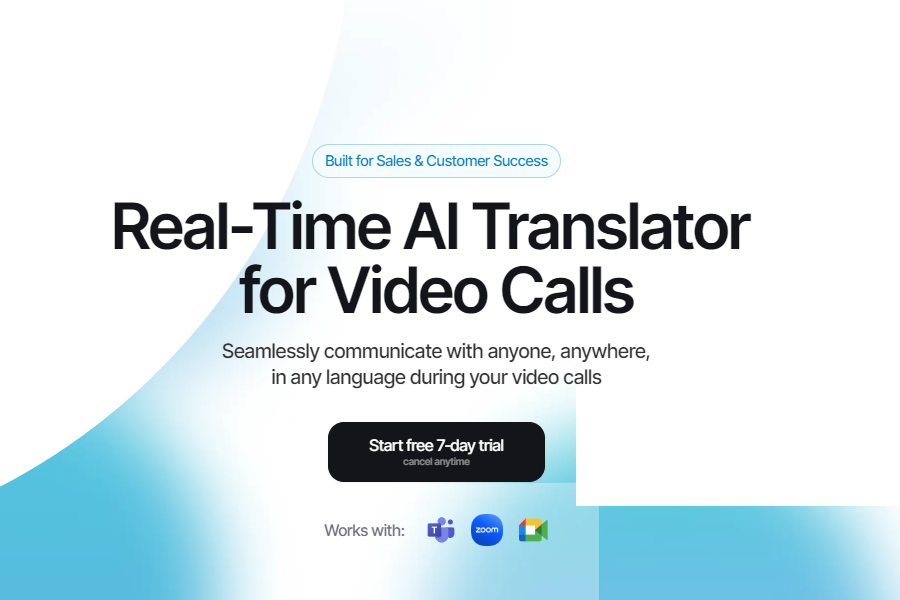
Recal.dev AI
AI Calendar Tool
The Headless Backend Solution for Custom Calendar and Booking Systems
Website:Recal.dev
For developers, building a stable and reliable booking or calendar feature often means diving deep into the API documentation of various calendar service providers, dealing with complex OAuth authorization flows, and wrestling with frustrating timezone issues. Recal.dev AI aims to completely liberate developers from this “integration hell.” It offers a unified, headless API backend, allowing developers to focus on crafting unique user interfaces and experiences without worrying about the complexity of the underlying calendar infrastructure.
1. Introduction to Recal.dev AI
Recal.dev AI ‘s core positioning is “infrastructure for the calendar space.” Unlike SaaS tools like Calendly or Acuity Scheduling that provide standard interfaces, Recal.dev adheres to the Headless architecture philosophy. This means it only provides powerful backend APIs and SDKs, giving complete frontend control back to the developer. As founding team member Torben Köhler stated on Product Hunt: “We believe developers should have full control. Recal provides the calendar integration layer without any frontend limitations.”
This design philosophy allows developers to break free from the constraints of off-the-shelf UIs and freely build any booking experience they desire—whether it’s an AI-driven smart scheduling assistant, a highly customized corporate booking process, or a specific feature embedded within a complex application. Recal.dev serves as the reliable backend, uniformly handling connections and synchronization with major calendar services like Google Calendar and Outlook Calendar. Its infrastructure is built on Cloudflare’s edge network, ensuring high availability and low latency. As of its announcement, the platform has successfully created over 51 million events, a testament to the stability and scale of its service.
2. Key Features of Recal.dev AI
Recal.dev AI ‘s core value is demonstrated through the following key features:
- Unified Calendar API: This is Recal.dev’s biggest highlight. Developers no longer need to write and maintain multiple sets of integration code for different providers like Google and Microsoft. Through a single Recal.dev API, they can manage calendar events across multiple platforms simultaneously, greatly simplifying the development effort. As one user lamented: “A unified Google and Outlook calendar API, imagine how much handling OAuth flows this saves.”
- Simplified OAuth Flow: The first hurdle in calendar integration is often the tedious OAuth authorization. Recal.dev abstracts and simplifies this process, providing a smoother path for user authorization and reducing significant configuration work for developers.
- Robust Timezone Handling: One of the core challenges of calendar systems is timezones. Recal.dev has a built-in, comprehensive timezone management mechanism, automatically handling timezone conversions for event creation, display, and reminders, ensuring global users see the correct schedule at the correct time. Torben Köhler also confirmed that their API is UTC-based, offering developers the optimal timezone handling experience.
- True Headless Architecture and Frontend Freedom: Recal.dev neither provides nor mandates any frontend UI components. Developers can use any frontend framework they prefer (such as React, Vue, Svelte) to build booking interfaces that perfectly match their product’s brand and user experience, truly embodying “Your UI, Your Rules.”
- Reliable Underlying Architecture: Built on Cloudflare’s global edge network, Recal.dev’s service can quickly respond to global user requests, offering high availability and data consistency assurance.

3. How Much Does Recal.dev AI Cost, and Is It Worth It?
Recal.dev AI employs a clear, transparent, and scalable pricing strategy, with the core philosophy of “predictable base price + flexible excess usage fees,” adhering to the principle of “the larger the scale, the greater the discount.” This pricing structure is designed to precisely match the needs of teams at different stages of development.
Currently, Recal.dev AI primarily offers three tiers of plans:
- Starter (Free Plan): This plan is the zero-cost entry point, offering 50 calendar connections and 100 bookings per month, including advanced analytics and priority email support. It’s perfect for individual developers or startups for product prototyping and testing.
- Growth (Growth Plan): Priced at $49 per month, this is the ideal choice for businesses entering the growth phase. It expands resources to 250 calendar connections and 500 monthly bookings. More importantly, it offers value-added services like dedicated support channels and one-on-one developer calls, significantly boosting integration efficiency and problem-solving speed.
- Enterprise (Enterprise Plan): Customized for large-scale enterprise clients, this plan provides volume discounts, customized Service Level Agreements (SLAs), advanced integration options, and priority feature development support, ensuring enterprise-level high availability and specific business scenario requirements are met.
So, is Recal.dev AI worth it? The answer depends on your specific scenario. For teams needing to quickly validate an idea or develop light integration applications, the feature-rich free version is highly attractive, offering a virtually risk-free starting point. As the business grows, the Growth plan’s cost-effectiveness becomes apparent. It replaces the high cost of significant engineering time required to self-develop and maintain a calendar integration backend with a manageable, fixed operational cost.
In conclusion, Recal.dev’s pricing model converts the complex costs of backend infrastructure into simple, predictable operational expenditure. If you are committed to building a custom booking system, the value of the weeks or even months of development and maintenance time saved by using Recal.dev undoubtedly far exceeds its service fee, making it a very high-value investment.

4. How to Use Recal.dev AI ? (Step-by-Step Guide)
The process of integrating Recal.dev AI is designed to be as efficient as possible. According to the official statement, a developer with an existing product foundation might only need less than 20 minutes to integrate a basic booking flow. Here is a typical step-by-step guide:
- Register and Obtain Credentials: First, register an account on the Recal.dev official website, create your project in the console, and obtain your unique API key or other authentication credentials.
- Integrate the SDK: Based on your technology stack, install the SDK or open-source scheduling package provided by Recal.dev into your application. This can often be done easily via package managers like npm.
- Configure Calendar Connections: Within your application, guide the user (or yourself) to authorize and connect their Google or Outlook calendar through Recal.dev’s simplified OAuth flow. Recal.dev securely handles these tokens.
- Build Your UI: This is the creative part. Using your chosen frontend technology, design and implement all elements of the booking interface: date and time pickers, type selections, form fields, etc.
- Call the API to Manage Events: When a user submits a booking, your frontend application directly calls the Recal.dev API to create, update, or query calendar events. Recal.dev is responsible for synchronizing all operations to the user’s authorized actual calendar in the background.
- Test and Deploy: Fully utilize the sandbox environment provided by Recal.dev for comprehensive testing, ensuring normal operation across different time zones and calendar services, then deploy to production.
5. Who is Recal.dev AI Suitable For?
Recal.dev AI is not a tool for general users; its target audience is very specific:
- SaaS Application Developers: Small to medium-sized or large SaaS teams who need to add booking, scheduling, resource reservation, and similar functionalities to their own products.
- AI Application Builders: Teams developing AI-driven applications like smart scheduling assistants and automated meeting arrangers that require reliable calendar operations as a foundation.
- Enterprise Internal System Developers: Developers who need to build customized booking systems for large enterprises (e.g., customer service, interviews, consulting) and require highly controllable UI and complex business processes.
- Startup Teams Pursuing Unique User Experience: Teams that do not want to use generic booking interfaces and aim to enhance brand value and user satisfaction through unique interaction design.
FAQ Auout Recal.dev AI
In summary, Recal.dev AI fills a significant gap in the calendar integration space, providing developers with powerful and flexible backend support. If you are facing the challenge of calendar integration and crave complete frontend autonomy, then Recal.dev is undoubtedly a solution worth deep evaluation.


